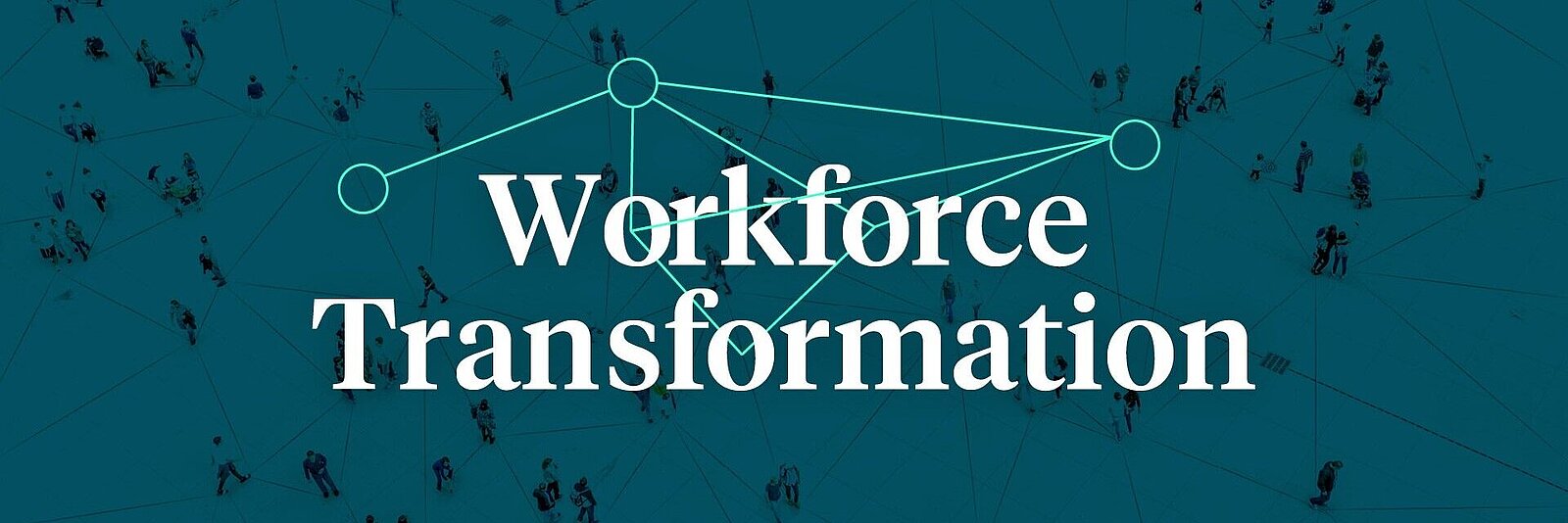
Glossary on workforce transformation
Attrition
Attrition refers to employee turnover or the rate at which employees leave an organisation - e.g. through termination for personal reasons or retirement - and are not replaced immediately.
Uniform employment system
One speaks of a uniform employment system when all employees of an organisation are employed in the same mode (example: permanent employees with compulsory attendance at the workplace). Flexible working models, on the other hand, provide for different working modes, both in terms of time and location (example: part-time working from home).
Gig economy
The gig economy refers to an area of the labour market in which jobs are awarded to independent freelancers ("freelancers") or marginally employed persons ("mini-jobbers") on a short-term basis (example: bicycle couriers for food delivery).
Great resignation
Great resignation (also known as the "great wave of resignations") is a trend in which employees are increasingly voluntarily quitting their jobs or considering doing so. The phenomenon first emerged during the coronavirus pandemic in the USA. The first effects have now also reached Europe.
Integrated value creation
Integrated value creation is a closed value cycle, i.e. all competencies are bundled within the organisation (example: from planning a car to selling it).
Learning agility
Learning agility is the willingness and ability of employees to learn from experience and successfully apply what they have learnt in new contexts. Employees who demonstrate learning agility want to constantly learn new things. In doing so, they reflect on their own weaknesses and are always open to new ways of tackling challenges and questioning existing views and opinions.
Megatrend
Describes an epochal (global) change that affects all levels of society and therefore has an impact on all organisations and individuals. Megatrends usually have a duration of several decades (example: digitalisation, new work).
Meta-competences
Meta-competences are skills that are not limited exclusively to functional knowledge. They are conceptually overarching skills that make rapid adaptation to a future, constantly changing world more likely (example: willingness to change, learning agility).
New Ways of Working
By New Ways of Working, we mean the new way in which work is carried out. This includes, in particular, the flexible organisation of working hours and location as well as their orchestration within the workforce. Legal foundations play just as important a role in enabling New Ways of Working as new ways of managing employees (e.g. remote leadership) and anchoring them in the corporate culture. The coronavirus pandemic has increased the importance of New Ways of Working in many areas. For example, new ways of working have been partially enshrined in law through home office regulations.
New Work / Future of Work
New Work / Future of Work refers to the result of the structural change in working methods and work requirements caused by digitalisation and the changing needs of the new generations entering the labour market. Work-life balance, the involvement of employees in decision-making and the demand for meaningful work are becoming increasingly important. Workforce transformation describes the way to achieve this target state.
Nearshoring
Special form of offshoring (see below), which only describes the relocation to a neighbouring country in order to create greater cultural, temporal and spatial proximity.
Offshoring
In general, the geographical relocation of operational activities, especially operational business processes, abroad ("foreign relocation"), mainly due to more favourable conditions in terms of personnel costs (example: international location in Bangladesh). In contrast, outsourcing involves the outsourcing of organisational processes.
Outsourcing
Outsourcing describes the outsourcing of services previously provided by a company itself to external service providers. In contrast to offshoring, outsourcing involves external service providers taking over certain tasks or internal company processes. This requires certain knowledge that is not available within the company itself or is too cost-intensive (example: outsourcing accounting).
Personality and skills profile
There is a recognisable trend in recruiting that the sole focus on the requirements for an open position (professional qualifications) is no longer sufficient. Instead, the focus is shifting to more stable characteristics such as (behavioural) skills or personality traits, which are more indicative of how a person will adapt to future, as yet unknown challenges.
Reskilling
Reskilling describes the learning of new skills in order to be able to perform a different job (a new field of activity) than the one originally learnt (example: from marketing expert to data analyst).
Retention
The term retention refers to measures that bind employees to the company, which is becoming increasingly important in a time of fluctuation (attrition) (example: intrinsic and extrinsic motivational measures, benefits in the form of offers for employees).
Scenario competence
Scenario competence is the ability to think in different scenarios (e.g. different development variants), which facilitates decision-making in situations of high complexity and uncertainty.
Talent acquisition
Talent acquisition, also known as hiring or recruiting, refers to the search for new employees. Due to the shortage of skilled labour, the search for talent is becoming increasingly difficult (keyword: "war for talent").
Upskilling
Upskilling is the acquisition of new or the expansion of additional skills and qualifications within a professional field in order to be able to perform the current position better (example: further training in the use of digital media for HR experts in order to lead digital workshops).
VUCA
The acronym stands for Volatility - Uncertainty - Complexity - Ambiguity.
Workforce Transformation
Workforce transformation (WFT) describes the process of changing workforces in the face of changes in working methods and work requirements (e.g. the automotive industry: moving away from the production of combustion engines towards "electric specialists"). This process must be strategically managed in order to ensure the company's long-term success. See also: New Work/Future of Work.